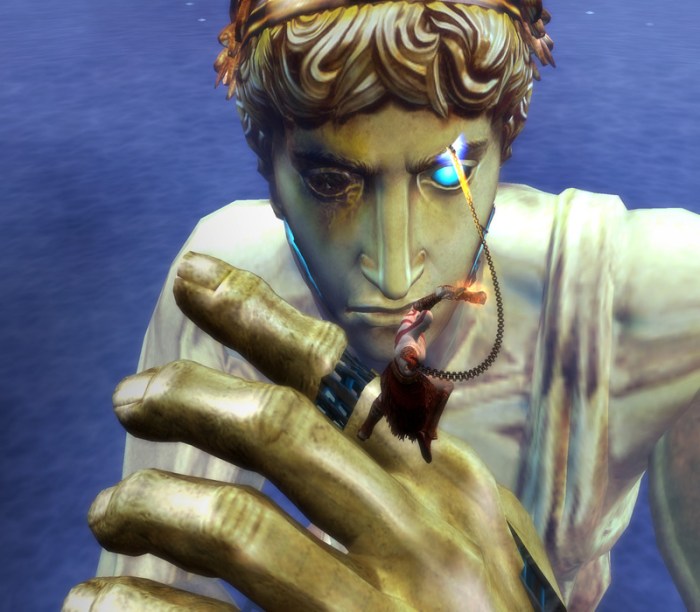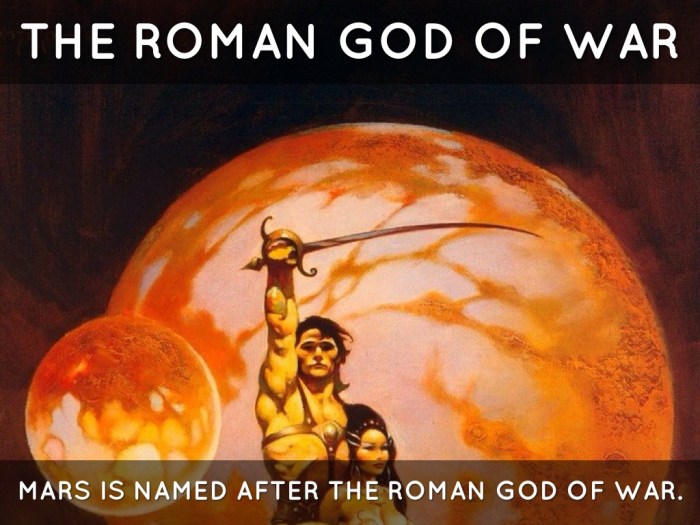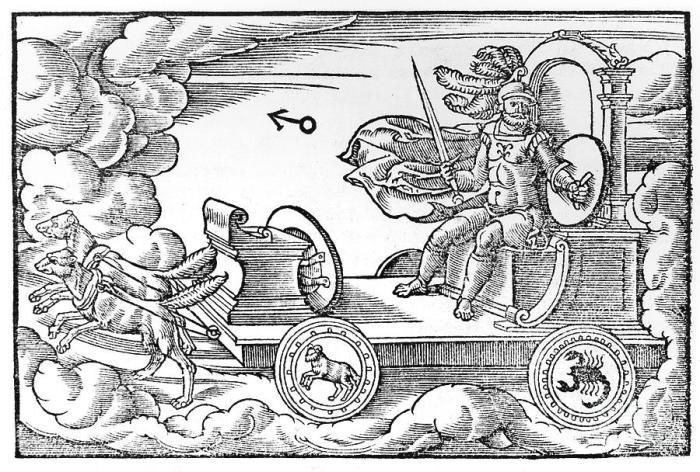Who was the Roman god of war? Mars, the mighty, stands tall as the embodiment of raw power and military prowess in Roman mythology. From his origins to his enduring legacy, let’s delve into the fascinating world of the Roman god of war.
As the protector of Rome and the patron of soldiers, Mars played a pivotal role in shaping Roman society and its military might.
Introduction to the Roman God of War

The Roman god of war, Mars, was one of the most important and revered deities in Roman mythology. He represented the raw power and violence of battle, and his favor was sought by both generals and soldiers alike. Mars was also a protector of the Roman people, and his cult was closely associated with the city of Rome itself.
As the god of war, Mars had a number of important roles and responsibilities. He led the Roman armies into battle, and he protected them from their enemies. He also presided over the rituals and sacrifices that were performed before and after battles.
In addition, Mars was responsible for the maintenance of military discipline, and he punished those who broke the rules of war.
Mars in Roman Society
Mars was a central figure in Roman society, and his cult was one of the most important in the Roman religion. The month of March was named after him, and he was celebrated with a number of festivals throughout the year.
The most important of these festivals was the Equirria, which was held on March 14th and 15th. During the Equirria, horses were raced in honor of Mars, and sacrifices were made to him. The Equirria was also a time for military parades and other displays of martial prowess.
Origins and History of the God of War: Who Was The Roman God Of War

The Roman god of war, Mars, traces his origins to the ancient Italic god of agriculture and fertility, known as Mavors. Over time, as Rome expanded its military power, Mars evolved into the god of war, embodying the Roman military’s strength and discipline.
The Roman god of war, Mars, was a formidable deity who protected soldiers and inspired victory. His presence was felt in every aspect of Roman life, from the ancient Roman palace to the battlefield. Mars’s influence extended beyond the physical realm, as he was also revered as the father of the Roman people.
The influence of Greek mythology on Roman religion also played a significant role in shaping the character of Mars. The Greek god of war, Ares, was a fearsome and bloodthirsty deity, and his attributes were gradually adopted by Mars. However, Mars retained his distinct Roman characteristics, emphasizing military strategy and discipline rather than raw aggression.
Influences of Etruscan and Greek Deities
The Etruscans, an ancient civilization that flourished in central Italy before the rise of Rome, also influenced the development of Mars. The Etruscan god of war, known as Maris, was associated with fertility and the underworld. These aspects were incorporated into the Roman conception of Mars, further enriching his complex character.
In addition to Greek and Etruscan influences, Mars also absorbed elements from other cultures, such as the Celts and Germans. As the Roman Empire expanded, it encountered different warrior traditions and beliefs, which were often assimilated into the Roman pantheon.
This process of cultural exchange contributed to the multifaceted nature of Mars as the Roman god of war.
Attributes and Symbolism of the God of War
The Roman god of war, Mars, was a formidable and iconic figure. His physical appearance, weapons, and symbols reflected his power, strength, and the destructive nature of warfare.
Mars was often depicted as a muscular and bearded man clad in armor and a helmet. He carried a spear and a shield, representing his prowess in combat. His armor was adorned with the heads of wolves, symbolizing his ferocity and cunning.
Physical Appearance
- Muscular and bearded
- Clad in armor and helmet
Weapons and Armor
- Spear: Symbol of his martial prowess
- Shield: Representation of defense and protection
- Armor adorned with wolf heads: Symbolizing ferocity and cunning
Symbols
- Wolf: Associated with Mars due to its strength and predatory nature
- Spear and shield: Emblems of his role as a warrior
- Red: The color of blood and warfare, often associated with Mars
Cult and Worship of the God of War

The cult of Mars, the Roman god of war, played a significant role in Roman religious life. His worship was deeply ingrained in the military and political spheres, with rituals and ceremonies designed to ensure victory in battle and protect the state.
Temples and Festivals
Mars was honored with numerous temples throughout the Roman Empire. The most prominent was the Temple of Mars Ultor, located in the Forum of Augustus in Rome. This temple was built by Emperor Augustus to commemorate his victory over Antony and Cleopatra at the Battle of Actium in 31 BC.
The temple housed a statue of Mars Ultor, depicted as a seated figure wearing a cuirass and holding a spear.
The festival of Mars, known as the Equirria, was celebrated annually on February 27 and March 14. The festival featured horse races and sacrifices to the god, and it was believed that the outcome of the races could foretell the success of Rome’s military campaigns.
The Roman god of war was Mars, who is often depicted with a spear and a shield. Mars was the patron of soldiers and was believed to protect them in battle. In Greek mythology, there are many goddesses associated with war, such as Athena, the goddess of wisdom and war, and Enyo, the goddess of war and bloodshed.
Despite the differences between the Roman and Greek gods, both cultures recognized the importance of war and the need for divine protection in battle. Mars, the Roman god of war, and the greek goddesses of war all played a significant role in their respective mythologies.
Sacrifices and Rituals
Sacrifices were an essential part of the worship of Mars. Animals, such as bulls and horses, were commonly sacrificed to the god. The blood of the sacrificed animal was often sprinkled on the altar or used in rituals to purify the army before battle.
In addition to sacrifices, other rituals were performed to honor Mars. The Salii, a group of twelve priests, performed a sacred dance called the Salian dance in honor of the god. The dance involved leaping and striking shields, and it was believed to bring good fortune in battle.
Cult of Mars and the Military
The cult of Mars was closely intertwined with the Roman military. Mars was the patron god of soldiers, and his image was often carried into battle on standards and banners. Roman soldiers swore oaths to Mars before going into battle, and they believed that the god would protect them in combat.
The worship of Mars also played a role in Roman politics. Successful generals often dedicated temples or altars to Mars to commemorate their victories. The cult of Mars became a symbol of Roman military power and the empire’s dominance.
Influence on Roman Culture and Society

The Roman god of war, Mars, left an enduring mark on Roman culture and society. His influence permeated various aspects of Roman life, from art and literature to military strategy and societal values.Mars’s influence on Roman art was profound. He was often depicted in statues and reliefs as a fierce warrior, clad in armor and wielding a spear or sword.
These depictions reflected the Roman admiration for military prowess and strength. In literature, Mars was a popular subject for poets and playwrights. Virgil’s Aeneid, for instance, portrays Mars as a powerful and formidable force on the battlefield.Beyond the realm of art and literature, Mars also played a significant role in shaping Roman military strategy.
The Roman army was organized into legions, each of which had a standard bearing the image of Mars. This served as a symbol of the god’s protection and guidance in battle. Roman generals often invoked Mars before going into combat, seeking his favor and victory.Mars’s
influence extended beyond the battlefield into the realm of Roman values and beliefs. He was seen as a symbol of courage, strength, and honor. Romans believed that Mars would reward those who displayed these qualities, both in war and in civilian life.
The god’s presence in Roman culture helped foster a sense of discipline, loyalty, and patriotism among the Roman people.
Influence on Roman Art and Literature, Who was the roman god of war
Mars’s influence on Roman art and literature was significant. His image was frequently featured in statues, reliefs, and mosaics, often depicting him as a fierce warrior clad in armor and wielding a spear or sword. These depictions reflected the Roman admiration for military prowess and strength.
In literature, Mars was a popular subject for poets and playwrights. Virgil’s Aeneid, for instance, portrays Mars as a powerful and formidable force on the battlefield.
Influence on Roman Military Strategy
Mars played a significant role in shaping Roman military strategy. The Roman army was organized into legions, each of which had a standard bearing the image of Mars. This served as a symbol of the god’s protection and guidance in battle.
Roman generals often invoked Mars before going into combat, seeking his favor and victory.
Influence on Roman Values and Beliefs
Mars’s influence extended beyond the battlefield into the realm of Roman values and beliefs. He was seen as a symbol of courage, strength, and honor. Romans believed that Mars would reward those who displayed these qualities, both in war and in civilian life.
The god’s presence in Roman culture helped foster a sense of discipline, loyalty, and patriotism among the Roman people.
Last Word
Mars, the Roman god of war, remains an enduring symbol of strength, courage, and the unyielding spirit of the Roman Empire. His legacy continues to inspire awe and fascination, reminding us of the profound impact that gods and beliefs have on human history and culture.


